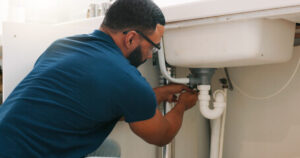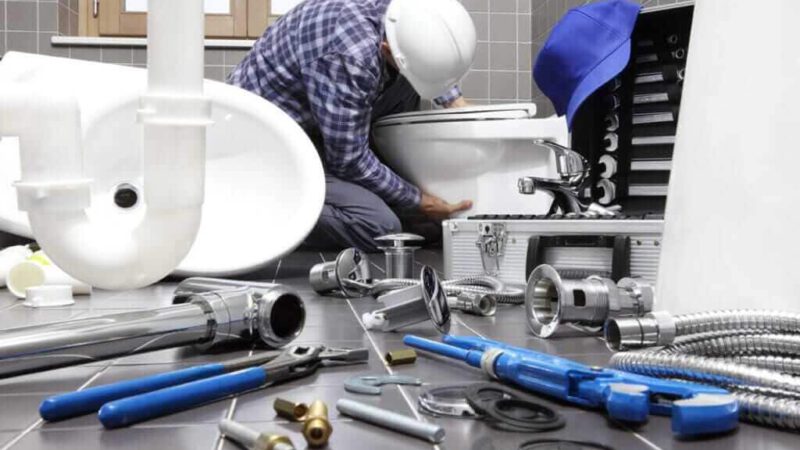Plumbers: A Promising Blue-Collar Profession
Plumbers Bradenton are known for unclogging toilets and fixing leaky faucets, but their skills extend far beyond these simple tasks. They design piping systems that disperse water and remove waste, connect heating and cooling systems, and more.
Visually inspect all visible plumbing lines and fixtures for signs of leaks, corrosion, breaks or clogs. Check the drains and toilets for slow drainage or gurgling sounds, as well as water flow rates.
Plumbers install, repair, and maintain the pipes and fixtures that deliver water, remove waste, and provide heating and cooling in residential and commercial buildings. They may specialize in a particular aspect of plumbing systems and must be familiar with the relevant codes and regulations. Some common job duties include examining plumbing fixtures and pipes for signs of leaks, clogs, or damage. They also test water pressure and drainage flow to ensure adequate performance. Plumbers often use hand and power tools to perform their work, but are sometimes required to operate large machinery like steamers or drain cleaners.
Installation of Plumbing Systems
New construction projects require plumbers to collaborate with architects, builders, and construction teams to lay out piping systems according to specifications and blueprints. They may also be responsible for ensuring that plumbing systems integrate seamlessly into the overall building structure. Plumbers who specialize in remodeling or retrofitting existing homes or businesses may work on kitchen and bath renovations, installing water-saving faucets, showerheads, and toilets, as well as dishwashers and garbage disposals.
Examining Plumbing Fixtures
Every part of a plumbing system needs to be examined periodically for problems. Plumbers check the condition of pipes for signs of corrosion, kinks, or improper slope. They look for leaking connections and joints, and assess the effectiveness of water shut-off valves. They inspect sinks, tubs, and showers for signs of water leaks, faulty draining, or overflow. They may also inspect washing machines, dishwashers, and ice makers for proper functioning and safety.
Leaks and Damaged Pipes
Plumbers test all visible pipes for leaks using visual examination, soapy water, or electronic acoustic equipment. They check for rust or corrosion in supply lines, drains, and joints, as well as a lack of support, excessive slope, or loose connections. Leaks are a serious problem that need to be fixed immediately, as they can cause significant water damage and mold growth.
Besides examining and testing plumbing components, plumbers must be aware of the latest water conservation methods and technologies. They must be able to recommend and install energy-efficient appliances and fixtures, as well as advise clients on how to best manage their water usage. In addition, they must be knowledgeable of local codes and regulations regarding gas line installation and maintenance.
Education and Training Requirements
The field of plumbing is one of the most lucrative blue-collar professions, offering job security and a high salary. It also provides plenty of opportunities to learn, grow, and make a difference in people’s lives. If you’re interested in becoming a plumber, the first step is enrolling in a vocational school or apprenticeship program. These courses provide an introduction to plumbing principles, as well as training in pipe cutting and soldering, installing fixtures, and troubleshooting. In addition, you’ll learn how to read and interpret blueprints and technical drawings.
After completing the course, you’ll be able to pursue a career as a journeyman plumber. You can then continue your education by pursuing an associate’s degree in plumbing or a bachelor’s degree in business management. This will give you the skills and experience you need to work in a variety of settings, including commercial, residential, or industrial plumbing.
Alternatively, you can also choose to earn a master’s degree in plumbing. This will allow you to take on more complex projects, such as installing or repairing sewer lines, water heaters, and heat pumps. You’ll also be able to handle large-scale piping systems like those for natural gas or oil pipelines, as well as install water treatment plants and public water supply systems.
Aside from formal training, you can also improve your chances of landing a plumber job by taking additional classes or workshops. These events often feature industry experts who can offer insight and advice on how to advance your skills. Moreover, they’re a great way to network and meet potential employers and colleagues.
Besides attending workshops, you can also sign up for an online course to further expand your knowledge of the plumbing industry. There are many reputable online schools that offer a wide range of plumbing courses, from basic to advanced. Just remember to choose a course that aligns with your career goals and fits into your schedule. Also, make sure to study hard during your training sessions and avoid distractions. This will help you absorb and retain information faster. You may also consider pursuing additional certifications in areas like medical gas piping or process piping.
Work Environment
Plumbers are in high demand, and this is reflected in their competitive wages. This career also offers job security and a potential for long-term stability. Furthermore, plumbing is an important service that ensures homes and businesses have functioning water and waste systems. This makes it a meaningful and fulfilling profession. For example, if you respond to an emergency call and fix a burst pipe, it will provide immediate relief for the homeowner, and you’ll get satisfaction from knowing that you made a difference in someone’s life.
A good plumber is skilled at using their hands, problem-solving, and critical thinking. They also have strong people skills, allowing them to interact with clients in a courteous manner. Additionally, they speak in clear language and avoid technical terms to minimize confusion and misunderstandings. Plumbers must be comfortable working in a variety of settings, including residential and commercial properties and construction sites. This flexibility provides them with a range of opportunities to enhance their experience and increase their earning potential.
Many plumbers have their own business, which allows them to set their own hours and choose their work assignments. This also gives them the freedom to pursue other interests outside of work. In addition, experienced plumbers can take on a mentoring role to help newcomers in the industry.
The plumbing industry is constantly evolving with new technologies and techniques. It is therefore crucial for plumbers to stay up-to-date with these changes. This can be achieved through professional development programs and through reading trade publications. Moreover, plumbers should always wear personal protective equipment when performing dangerous tasks. This includes wearing gloves, goggles, and a hard hat.
A career as a plumber is an excellent option for those who enjoy hands-on work and have strong problem-solving skills. In addition, the work environment is flexible and can be very rewarding. However, it is important to understand the risks associated with the job before pursuing it. This includes exposure to hazardous chemicals and equipment, as well as physical injury due to a slip or fall. Moreover, plumbers should be prepared for the possibility of being called to an emergency situation, which may require them to work under pressure and ignore safety protocols.
Salary
Plumbing skills are in high demand, even in times of economic uncertainty. Plumbers are needed to maintain and upgrade residential, commercial, and industrial pipe systems, and they work with a variety of tools and materials to do so. This job also offers a flexible schedule and stable wages. In addition, many experienced plumbers can choose to become independent contractors and set their own rates. This allows them to maximize their earnings.
Plumbers need excellent customer service skills to communicate with clients about their issues and provide advice or recommendations on plumbing solutions. They also collaborate with construction teams to ensure plumbing is integrated seamlessly into building projects and meets all applicable standards and regulations. Emergency services are another common aspect of this career, so plumbers must be willing to work on call at odd hours to respond to calls for burst pipes or clogged toilets.
On-the-job training is a major part of becoming a plumber, and it can be difficult for new hires to keep up with the pace of more senior journeymen. This can lead to frustration, as new hires may feel overwhelmed or unqualified to take on certain tasks. As such, it’s important for employers to have structured on-the-job training programs that help new employees grow their skill sets as quickly and effectively as possible.
Plumber salary ranges vary widely depending on experience, location, and type of work. Urban areas with higher costs of living, like San Francisco or New York City, tend to pay above-average salaries. Union plumbers earn more than non-union counterparts, and they typically have access to benefits like health insurance and pension plans. Specializing in HVAC plumbing, green plumbing, or backflow prevention further increases earning potential.
As demand for plumbing expertise continues to rise, this is a good time to consider starting a career in this skilled trade. With a strong employment outlook and a solid average plumber salary, this is a great career choice for people who are comfortable working with their hands and enjoy solving problems. Those who have physical stamina and a strong desire to learn will find this is a fulfilling career that allows for plenty of professional growth.

